
Plebiscite vs Referendum Difference and Comparison
A referendum (plural: referendums or less commonly referenda) is a direct vote by the electorate on a particular proposal or issue. This is in contrast to an issue being voted on by a representative. Plebiscite. A direct vote in which the entire electorate is invited to accept or refuse a proposal. The new constitution was ratified in a plebiscite.

Tools of Direct Democracy Referendum Initiative Recall Plebiscite YouTube
Referendum vs. plebiscite. According to the Initiative and Referendum Act, a referendum is "the power of the electorate to approve or reject a legislation through an election called for the purpose." A plebiscite, on the other hand, is "the electoral process by which an initiative on the Constitution is approved or rejected by the people."

Plebiscite Vs Referendum YouTube
plebiscite, a vote by the people of an entire country or district to decide on some issue, such as choice of a ruler or government, option for independence or annexation by another power, or a question of national policy. In a plebiscite, voters are asked not to choose between alternate regimes or proposals but to confirm or reject the.

Brexit draft deal What is the difference between a people's vote and a new referendum? YouTube
An election gives voters the opportunity to choose representatives who will form representative institutions and government, whereas a referendum offers us a simple 'Yes' or 'No' choice in a debate clearly polarized between two possible outcomes, one of which is then implemented. In an election we must decide between several different.
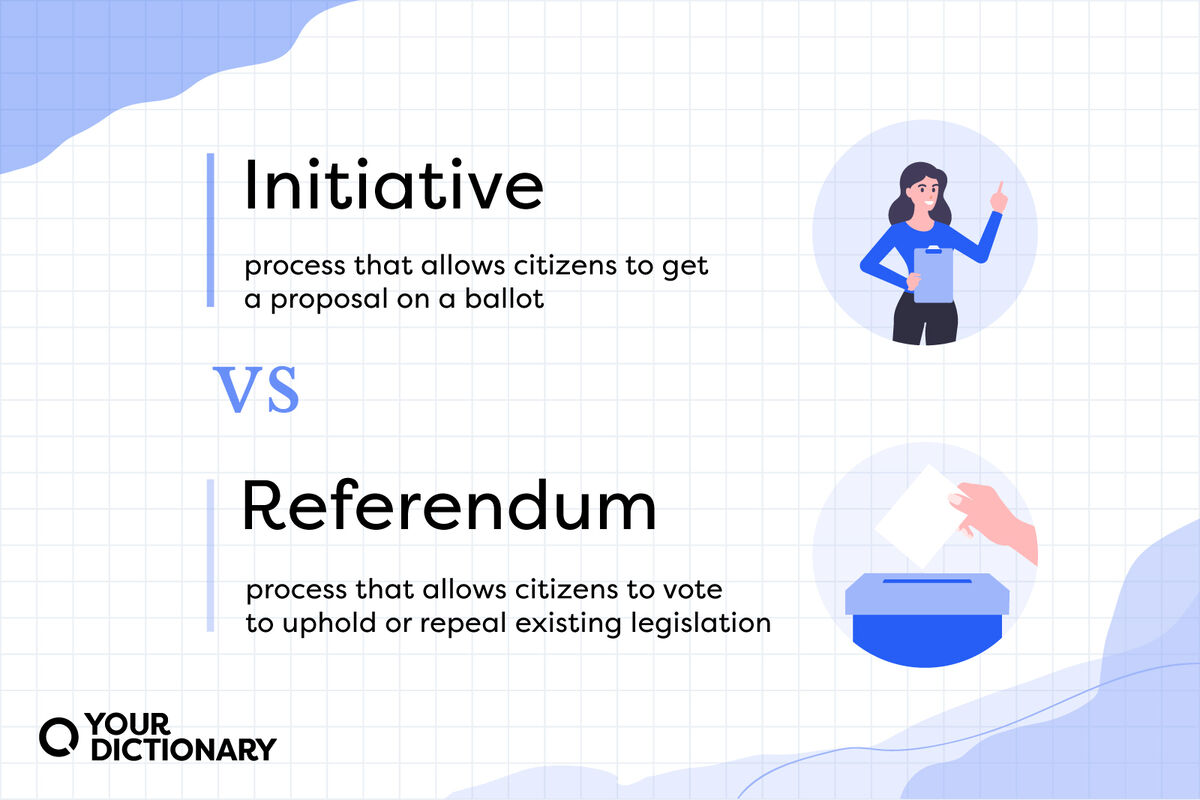
“Initiative” vs. “Referendum” What’s the Difference? YourDictionary
A referendum (pl.: referendums or less commonly referenda) is a direct vote by the electorate on a proposal, law, or political issue. This is in contrast to an issue being voted on by a representative.This may result in the adoption of a new policy or specific law, or the referendum may be only advisory.In some countries, it is synonymous with and also known as plebiscite, votation, popular.
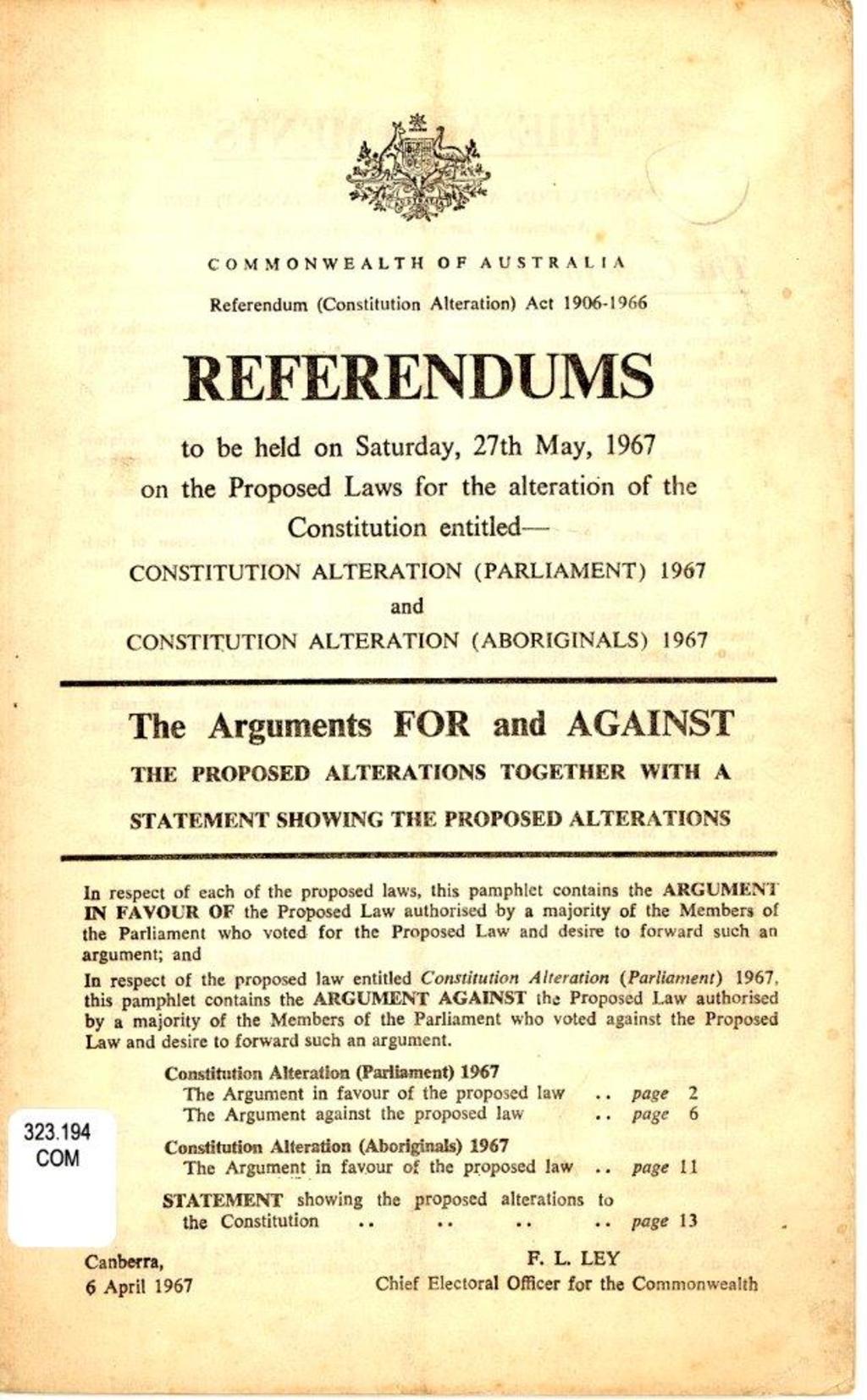
Referenda and plebiscites—what’s the difference? · Museum of Australian Democracy at Old
A referendum, also known as a Constitutional referendum, is a vote to approve change to the Australian Constitution. According to Section 128 of the Constitution, a referendum is the only way in which the Constitution can be amended. In order to pass, referendums need to pass on a 'double majority'. This means that both a majority of voters.
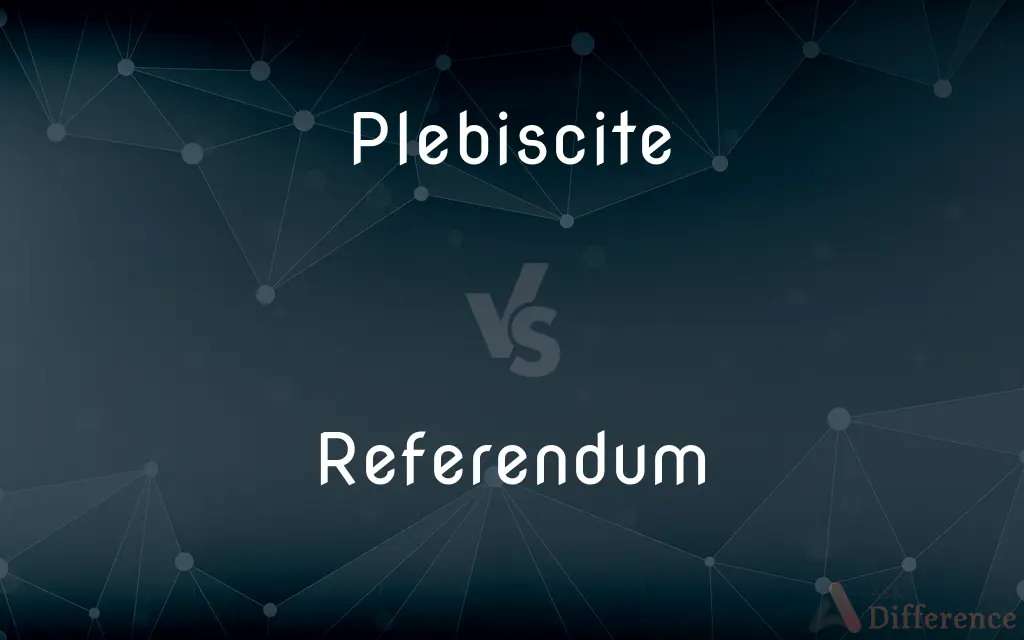
Plebiscite vs. Referendum — What’s the Difference?
referendum and initiative, electoral devices by which voters may express their wishes with regard to government policy or proposed legislation.They exist in a variety of forms. The referendum may be obligatory or optional. Under the obligatory type, a statute or constitution requires that certain classes of legislative action be referred to a popular vote for approval or rejection.
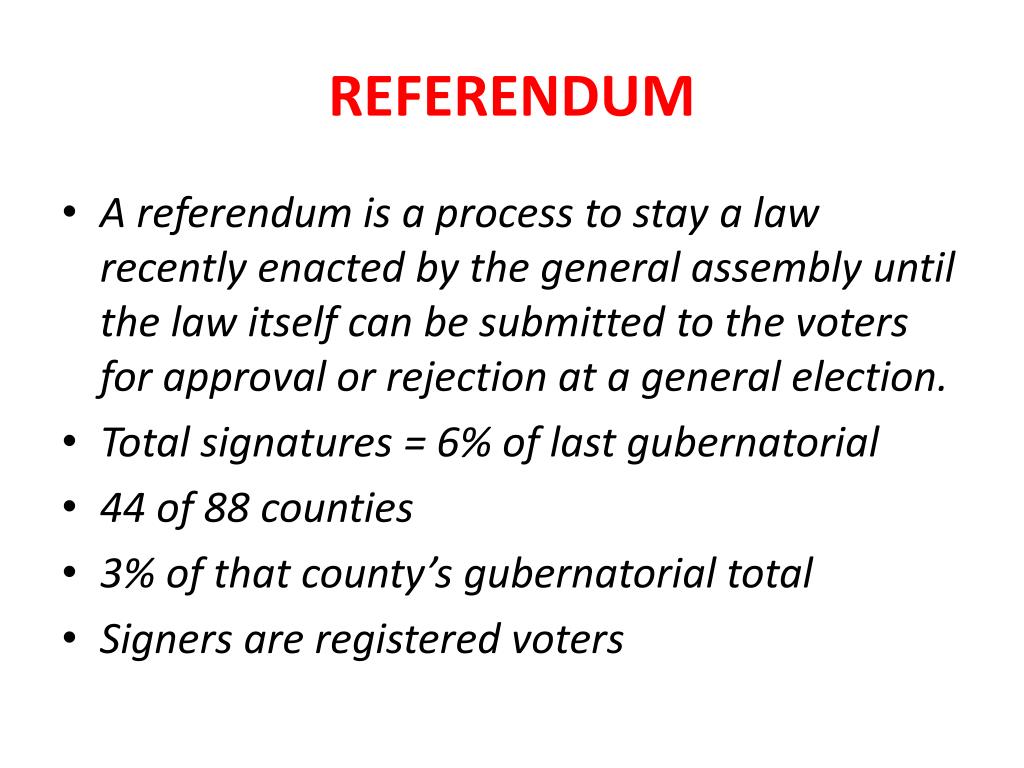
PPT REFERENDUM PowerPoint Presentation, free download ID2787470
Key Differences. A "Referendum" is generally a vote by the electorate on a particular issue or law, usually initiated by the government or legislature. "Plebiscite," on the other hand, is typically a direct vote by the citizens on an issue that often seeks to legitimize government actions. 9. "Referendum" usually addresses a specific policy or.

💐 Plebiscite example. Referendum. 20221017
The words referendum and plebiscite refer to electoral institutions in which the mass of the population votes on an issue. However, they have very different political connotations. Plebiscite is a negative term referring to an unfair and unfree vote in an undemocratic political system. It was a favourite device of French Emperors Napoleon.

Difference between Election and Referendum Difference Betweenz
Both an initiative and a referendum are types of proposals in terms of the law. We dive into what makes them different and why the distinction is important.. Plebiscite. Plebiscite (pronounced "pleb-uh-site") sounds like a rude word that someone might call you, but it's largely synonymous with referendums. Some people make the.

Issue Elections Referendums and Initiatives YouTube
A plebiscite is a vote by the whole people and is often used synonymously with a referendum. In the most recent literature a plebiscite has been defined as "an instrument, which allow [s] a government to appeal to people to express themselves with a yes or a no" [i].'The two terms do not always overlap in the legal, political and.
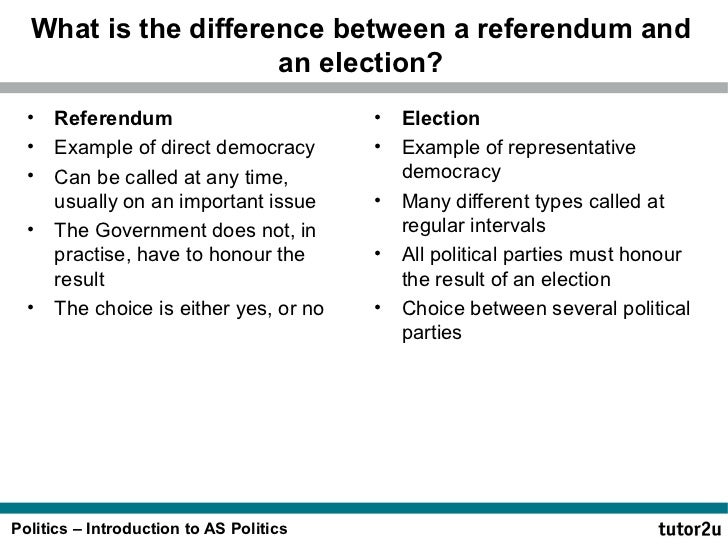
As referendums
We start with a couple definitions: the difference between a plebiscite and a referendum. As Duane Bratt, a political scientist with Mount Royal University, puts it, the difference is whether a.

What's the difference between a referendum, plebiscite and postal survey? YouTube
Referendum process. A proposed change to the Constitution must start as a bill - proposed law - in the Australian Parliament. An absolute majority - more than half of the total number - of senators and members of the House of Representatives must vote for the bill. The referendum must take place between 2 and 6 months after the bill is.
Plebiscite vs. Referendum What's the Difference and Why It Matters?
A major difference between the two forms of voting on a particular issue is the initiation. Referendums are termed initiatives for a reason. Whereas the initiation of a referendum may not always involve those in power, as has been the case in citizen initiated referendums in the past, a plebiscite can only be initiated by the representative.
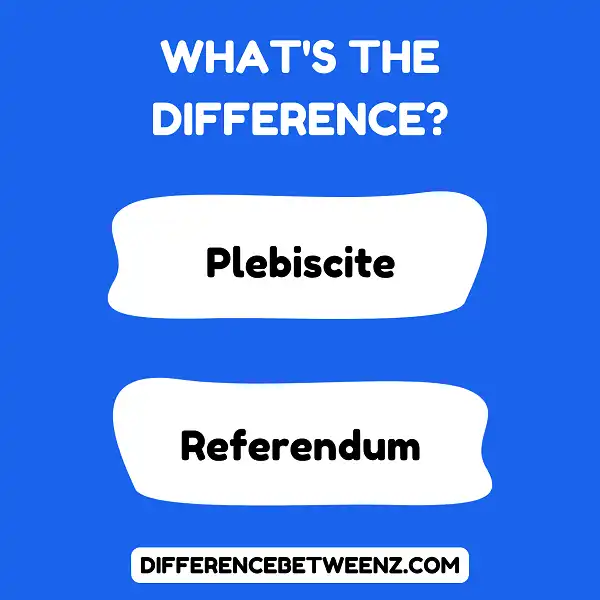
Differences between a Plebiscite and a Referendum Difference Betweenz
Key Takeaways. A plebiscite is a direct vote by the people to determine a political issue, such as a change in the constitution or sovereignty. A referendum is a general vote by the electorate on a specific proposal, such as a law or policy. Plebiscites resolve political crises, while referendums gauge public opinion on specific issues.
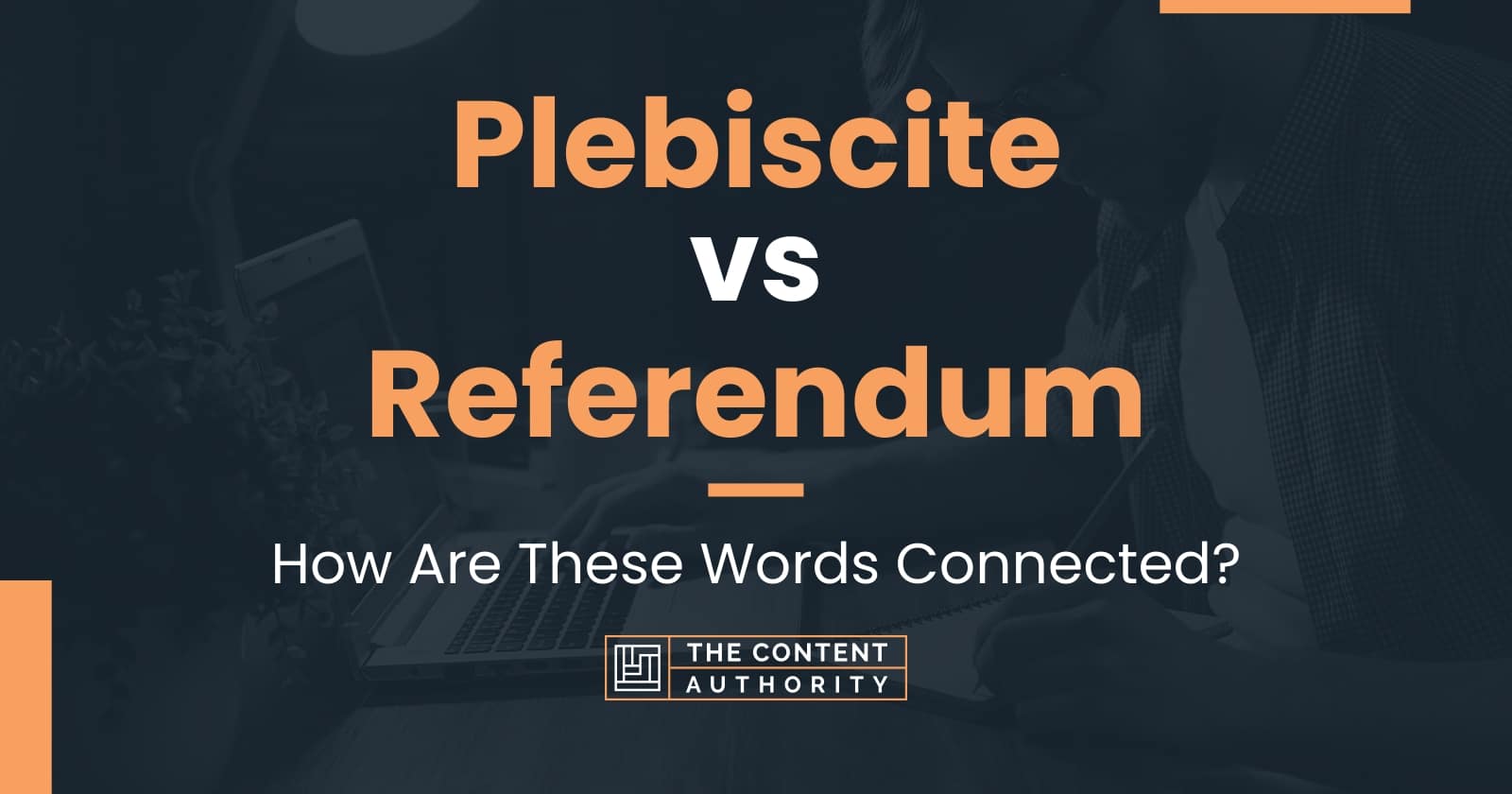
Plebiscite vs Referendum How Are These Words Connected?
Plebiscites are typically used to gauge public opinion on a particular issue, but they are non-binding. This means that the government is not required to act on the results of a plebiscite. Referendums, on the other hand, are binding. This means that the outcome of a referendum is legally required to be implemented.
- El Calafate Places To Stay
- Newcastle Upon Tyne England Map
- Ray White Real Estate Redcliffe
- Flights From Melbourne To Coffs Harbour Direct
- Walhalla Lodge Hotel Pub
- Fast And Furious 10 Australia
- Indian Tennis Players In Australian Open 2023
- Best Air Rifle For Pest Control Australia
- Used Livestock Crates For Sale
- Sbs News Presenters Female 2022
